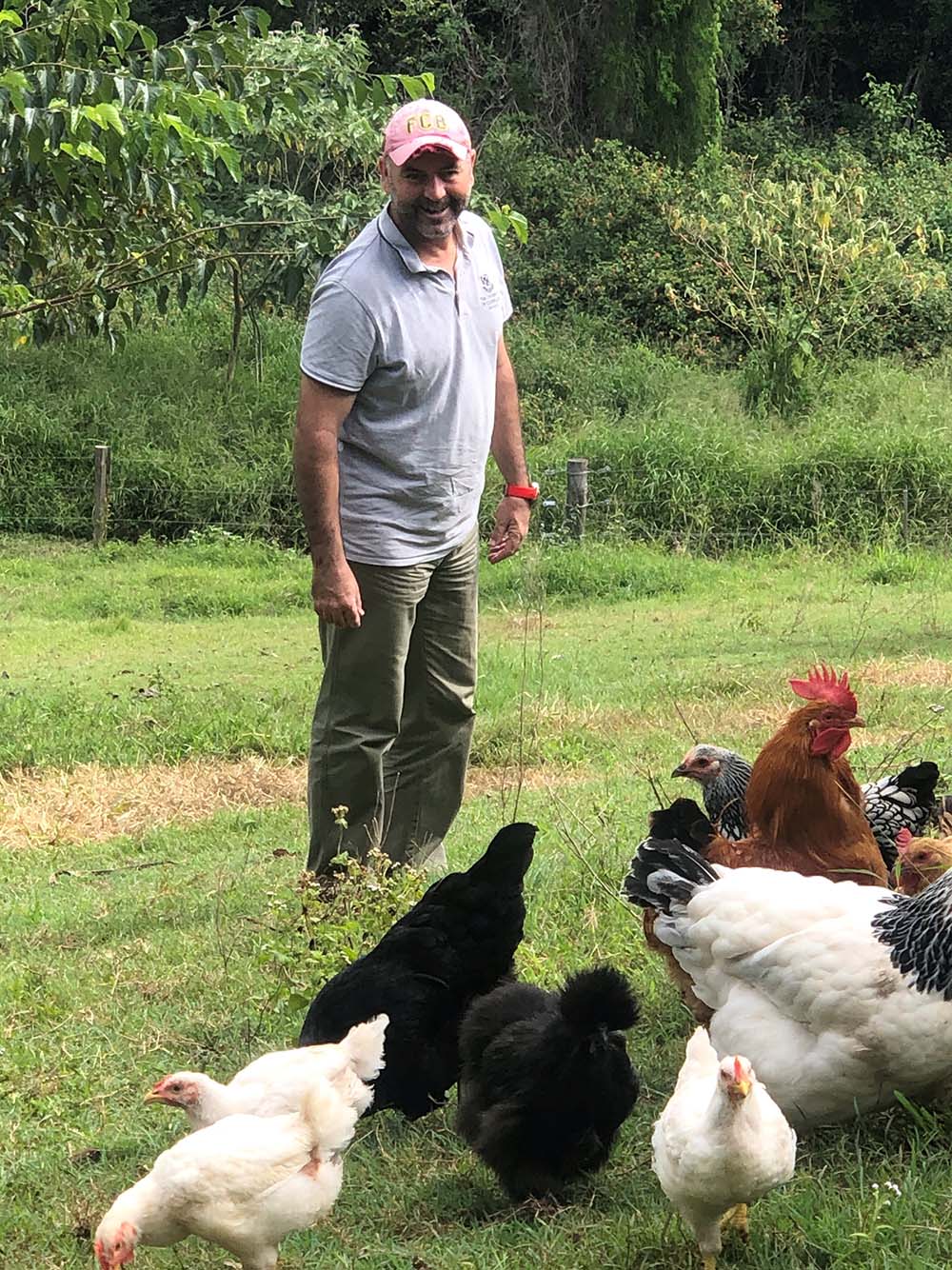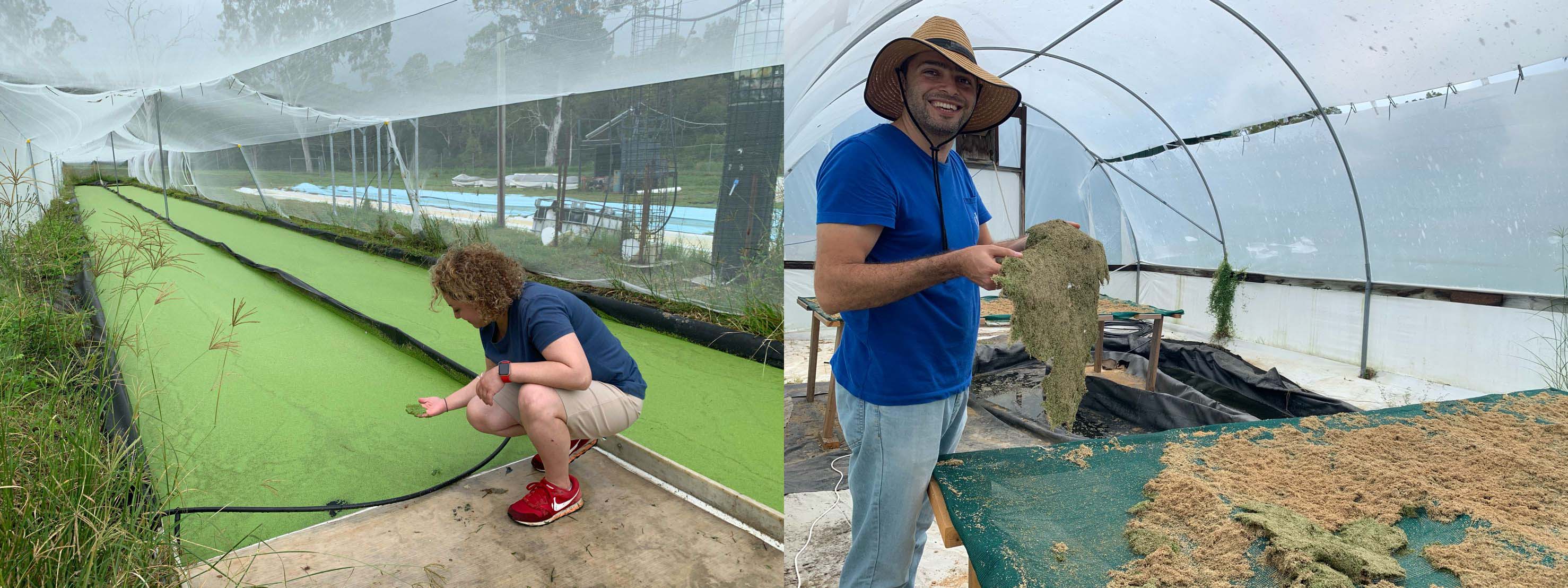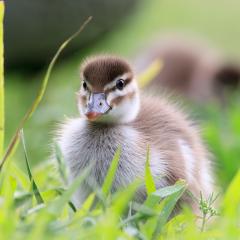Have you often imagined collecting fresh eggs from your very own backyard chooks? Or perhaps you just love the idea of a few fowls wandering around your garden pecking at worms? If you’ve never had chickens before, chances are you’re not quite sure where to start.
Professor Eugeni Roura, from UQ’s Queensland Alliance for Agriculture and Food Innovation (QAAFI), and Dr Elham Assadi Soumeh, from the School of Agriculture and Food Sciences, specialise in poultry science and animal nutrition, among other areas of research.
We asked them for their top tips on keeping chickens at home. They also shared insights into some of their current projects linked to commercial production.
What’s in this story?
- Benefits of keeping chickens at home
- Finding the right space for your chickens
- Choosing a chicken coop
- Choosing your chickens
- Providing food and water for your chickens
- Keeping your chickens safe
- Managing other chicken challenges
What are the benefits of keeping chickens at home?

“We have about ten chickens in our shed, and they are just fantastic for teaching the kids about routine and responsibility, and how to care for animals,” Prof Roura says.
Dr Soumeh agrees that chickens offer wide social benefits.
“Looking after chickens daily creates a hobby that keeps people engaged. This sense of purpose became very important during the pandemic, for example, when we saw the number of homes with domestic chickens increase substantially,” she says.
“There are excellent environmental benefits, too. You can create your own little bio-recycling factory in your backyard, giving your chickens fruit and vegetable food waste, alongside their regular balanced diets.
“Your free ranging chickens can also help with pest control as they search for beetles, grasshoppers, insects and grubs they eat. While doing so, they will naturally scratch your soil and turn it over, potentially depositing manure at the same time. So there are a range of cyclical reasons for, and environmental benefits to, keeping chickens.”
“Not to mention, if you have laying hens, you will also have access to regular, fresh eggs at home,” Prof Roura says.
“This is delicious and can help increase self-sufficiency and reduce food miles, which, even if it’s only on a small scale, is worth doing.”
Finding the right space for your chickens
Both Australia’s national free range egg standard and the RSPCA chicken guidelines recommend a minimum space of 1m2 per chicken, whether at home or on a commercial farm.
Of course, your chooks will be even happier with more space, if you have it available.
“There’s no magic number, but from there up, as much space as you can give them is nice,” Prof Roura says.
The other thing to think about is where to place your coop within your garden.
“Sunshine is great for chickens and they need the vitamin D as one of their key nutrients to produce high quality eggs,” Dr Soumeh explains.
“On the other hand, it gets very hot in Queensland, especially in summer, and you need to make sure your chickens have some good shade available throughout the day.”
If you are in an urban residential area in Brisbane, you will likely need a permit to keep chickens at home. And some rules may apply around how many chooks you can have and where you can place a coop relative to your fence, among other details. You can find information on the Brisbane City Council website.
If you live somewhere more regional or rural, you may not require a permit. For example, the rules in Lockyer Valley Regional Council areas, including Gatton, are different. It’s always best to check your relevant local council website before proceeding.
Choosing a chicken coop
Choosing or constructing a good chicken coop is essential, both Prof Roura and Dr Soumeh emphasise. A key goal is to have a structure that helps the chickens carry out their natural behaviours.
“Ideally, you want to provide your chickens with options for elevation so they can sleep above the ground. Some shelves or thick branches installed within your coop, for example. They naturally want to spend the night up high to avoid predators,” Prof Roura says.
Dr Soumeh says that nesting boxes, or secluded nooks and crannies, are also very important.
“Your hens will seek these out instinctively when they are ready to lay. Without them, you may find they lay on the ground, and then you will have floor eggs covered in manure, which you don’t want,” she says.
“Many of the home coops available today have a range of useful features. These include laying boxes that open to the outside, making it easy to collect your eggs without entering the coop, as well as structures on wheels, which can be moved around the garden as needed in different seasons or even times of day,” Dr Soumeh continues.
Choosing your chickens
There are many popular breeds of chickens for backyard pets, the Brisbane City Council website states. ISA Browns and White Leghorns are two of the most well-known. Roosters are not typically permitted in urban residential areas.
“My personal preference is to have a few different breeds in your brood,” Prof Roura says. “They’re cute and the kids love them, plus having different sizes can help the animals to naturally establish hierarchies without several chickens the exact same height and weight needing to fight it out!”
“If you want around 20 to 25 eggs per week, you will need about four or five chickens in your backyard,” Dr Soumeh says. “Each will lay four to five eggs per week, on average.”
Life spans can vary, as can the number of years in which your hens will lay. Be prepared to have hens that may live for quite a while longer than they are producing eggs. Brisbane City Council advise getting your chickens from a reputable supplier, who can answer many of these questions specific to different breeds.
You can also look into having some rescue hens from various commercial farm or battery locations. A quick Google will give you some options for your local area.
Providing food and water for your chickens
As an expert in poultry nutrition, Dr Soumeh has some simple ratios for feeding your chickens healthily at home.
“An adult female chicken eats about 4kg per month. Of this, between 2kg to 3kg should be specially purchased layer feed, which provides a balanced and healthy diet for your chickens. And then, 1kg to 2kg per month can be recycled food waste.
“Within that food waste, there needs to be at least 50% vegetable or green waste, while the rest can be pasta, bread and other carbs. You would very rarely give chickens any dairy, and certainly not any meat, although, when given the chance, they will forage for their own insects and bugs.
“They also need a reliable water source, which is topped up daily or, at the very least, every two days. Again, there are some good products on the market that can help automate water top-ups, which is useful if you are going away for a few nights, or even just working in the office during the daytimes when their water supply could be running low.”
On a larger scale, Dr Soumeh is currently supervising PhD student Mahdi Asadirad on a project to replace soybean meal in commercial feed with locally grown duckweed.
“The duckweed is protein-rich, as well as containing essential nutrients including vitamin A and beta carotene, which is what helps to give the yolks their beautiful orange colour.
“Also, in Australia our soybean feed is typically all imported from other countries, such as Brazil, where it often isn’t grown sustainably and it obviously travels a long way to get here, which isn’t very sustainable either.
“So this project is aiming to solve both of those issues.”

Keeping your chickens safe
Diseases and predators are two of the main challenges you will have to contend with when looking after your chickens, Prof Roura explains.
“In terms of predators, there are a number of animals that will prey on your backyard chooks if they are left out grazing in the yard. First and foremost, foxes, but also big lizards and snakes can also be a problem. Even big birds like eagles or hawks could potentially attack, depending on where you are located.
“Unfortunately, some of this is just part of the cycle of life and you may have to prepare yourself (and your children) for these possibilities. It can help to only let out your chickens on days when you are also home and in and out of the backyard.
“Keeping your coop as clean as possible and making sure you collect any eggs that are laid daily will also help to minimise the presence of animals like snakes, which are attracted to chicks and eggs in particular.”
Prof Roura also notes that chickens can suffer from a range of parasite and infectious diseases, which may require veterinary treatment. Again, you also need to prepare yourself that sometimes these diseases cannot be treated, he says. Especially where you and your family may grow quite fond of your chickens as household pets.
Prof Roura says UQ is very active in poultry research, and the University’s facilities – which include several chicken and laying hen sheds, and a hatchery – are a hub for diverse and small-to-medium scale chicken research projects.
“One of our most exciting projects at the moment is trying to improve the embryonic development of chickens so that they are more resilient to diseases. The goal is to decrease the dependence on antibiotic treatment so that we can produce eggs and keep chickens extremely healthy without antibiotics.
“We are doing this by working with the chickens while they are literally “in ovo” (in egg), seeing what factors we can influence to improve their overall health outcomes,” he states.
Read more about Prof Roura’s in ovo and newly hatched chicken research in this QAAFI article.
Managing other chicken challenges
Aside from diseases that affect the chickens themselves, some backyard poultry has been linked to diseases that can make humans quite ill. In 2020, the Queensland Government Health Department issued a warning about a number of instances where backyard chooks had been linked to Salmonella infections.
The government states that simple health advice such as always washing your hands after touching or looking after the animals, and ensuring young children do the same, is one way to help prevent transfer of this disease.
Where hens go, rodents also often follow, Dr Soumeh says. She explains that what attracts them is usually the chicken food, rather than the chickens themselves.
“Making sure you don’t overfeed your chickens, and not leaving lots of food scraps lying around, are both good ways to help minimise these issues.”
“And don’t forget to think about your neighbours,” says Prof Roura. “Roosters are not allowed in residential areas, but even hens can make quite a bit of noise. They can also be quite smelly, so, again, you need to commit to cleaning the coop regularly and keeping the surrounding environment tidy too.”
Want more information?
- The RSPCA has a good blog with more information on caring for chickens at home.
- For more great ideas on sustainable living, visit UQ Sustainability to get involved.
- To read about a range of innovative UQ agricultural research projects, visit the QAAFI website.






